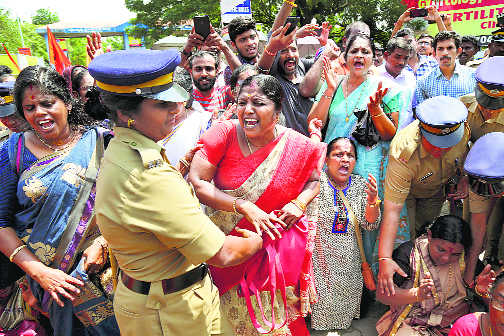
Police officers detain women protesting against the lifting of the ban by the Supreme Court that allowed entry of women of menstruating age to the Sabarimala temple, in Kochi. REUTERS
MANJU GUPTA
It’s that time of the year again. The Navratras are here and as the nation gears up to worship the female form, her right to worship because of her femininity is being debated.
These 10 days (and nine nights) are a celebration of womanhood, the sacred time when even the most chauvinistic misogynists will bow their heads to the divine feminine. Perhaps it's easy to revere a woman when she is up there on a pedestal, stoic and powerful, yet smiling benevolently, multitude of hands frozen in the act of blessing, giving and forgiving. It's the real women seeking an equal opportunity that are harder to handle. But my thoughts are not about the hypocrisy behind this practice and the mistaken belief that ‘Devi Pooja’ is a proof that women are cherished in our society.
Going off tangentially, I want to draw the readers’ attention to another contradiction. For a society that worships goddesses in the form of the divine mother, Devi ma, our attitude towards menstruation, an essential part of reproductive physiology, is appalling. For a country that feels that a woman is incomplete without motherhood, we look down about the bodily function that makes childbearing possible. We don’t want to talk about it, we don’t accept it as normal and the worst of all we consider it as unholy and unclean.
Any deviation from this ancient belief is met with resistance. The recent Supreme Court judgment to allow women of reproductive age into the Sabarimala temple premises has generated mixed reviews. While many hailed it as a much-needed decision towards women empowerment and equality, others have labelled it as an unnecessary intrusion into personal law. I disagree with both sides. Does lifting the ban improve women’s stature? Will the ruling bring hordes of menstruating women to the Sabarimala temple? I doubt it. Because beliefs and religious rituals need social sanction more than legal right. Till society accepts certain practices, laws can’t achieve much.
I hail the judgment because it shuns the medieval belief that menstruating women are unclean and need to be segregated, not allowed to touch certain things or be touched. It breaks the taboo of considering menses a recurring monthly cooties, a domestic quarantine wherein women are excluded from social and cultural engagements.
This social ostracisation has practical, physical and mental implications. Girls grow up ashamed of a physiological function and consider it a curse. Due to inadequate facilities almost a quarter of girls drop out of school after attaining menarche. A recent study indicated that a majority of Indian women don’t have access to hygienic menstrual care products. The rest use old rags, sand, sawdust, leaves, ash and even newspapers to absorb the flow. The practice of using cloth, which is otherwise acceptable, becomes a health hazard due to the need to hide it. Sun drying, which is the most effective way of disinfection, is not an option because of the associated stigma. From these unhealthy practices stem a majority of gynaecological infections and diseases.
Education about menstrual hygiene is paramount. Women family members may themselves be unaware of good hygienic practices and instead pass on cultural taboos and restrictions. So, sensitisation of health workers to disseminate this knowledge in the community is needed. But in the end we can teach women why they should use sanitary pads but unless the state subsidises these products these will remain a luxury.
Lastly, men need to be sensitised to the issue so that they can become a support system; something which I thought was impossible till recently. A male colleague recounted his adolescent son’s reaction when he was teaching him reproductive biology. The young boy said that he already knew that females led a difficult life due to social norms but was unaware that biologically too their life was tough; a sentiment which he will hopefully carry into adulthood.
Only a proactive multi-pronged strategy can remedy the situation. The saga of menstrual blood is not as trivial as it sounds; it is deeply embedded in religious and cultural practices and has far reaching effects on our society.
(The writer is a gynaecologist based at Gharaunda)



























